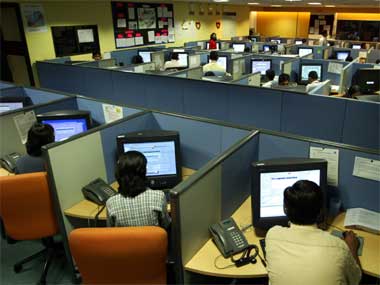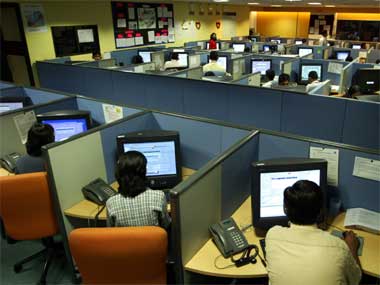Middle class Indians who came into the job market after 1991 have been accustomed to thinking that salaries and career opportunities have only one way to go: up. For the two generations that entered the middle class after independence but before 1991, the challenge was merely to find a job: once you got a job, life was a straight line to retirement.
Both certainties are now gone. For the 1991 generation, the dotcom bust was a mere aberration since the global economy simply boomed and boomed after that - till Lehman lowered the boom. For the generations that came before that - and went around advising their children to get into banks, or IT or other “stable” jobs - 2011-13 should come as a rude awakening.
We are now in uncharted territory. Jobs may come and go, but there is no certainty that they will last any more that 5-10 years, if you are lucky. Companies will be born as quickly as they may die, and companies will expand as quickly as they may contract. We are all now more vulnerable to the vagaries of global bumps and local troughs. Sometimes both may come together - as we are now witnessing.
[caption id=“attachment_1043093” align=“alignleft” width=“380”]
 We are entering a period of regular change in the business and political environment where jobs are not going to be that stable. So be prepared. Reuters[/caption]
We are entering a period of regular change in the business and political environment where jobs are not going to be that stable. So be prepared. Reuters[/caption]
So what is the right survival strategy for those who are currently in jobs, or out of a job, or looking for one? In many ways, the strategies have to take a leaf out of both grandpa’s book of prudence, and the current twenty-something’s idea of being loyal to no one but yourself. You have to be both prudent and greedy at the same time.
The game has changed, and you must, therefore, change your game too.
#1: Your first loyalty should be to yourself. Jobs will come and go as we move towards an economy where opportunities come and go quickly. This means companies may prefer contractual work rather than full-time workers; conversely, companies may even pay more for contractual work. If you have a job, it thus makes sense to accept a degree of risk in taking it up. Your focus should be on what you get out of it, and not in believing that companies will stand by you forever. Of course, there will be more stable jobs and less stable ones; which one you choose should depend on what stage of life you are in. Stability comes with lower pay often; and instability brings better opportunities. When opportunity comes, don’t be held back by a false sense of loyalty to your current employer. He is not going to stand by you when his company is in trouble either.
Impact Shorts
More Shorts#2: Your spending and saving patterns need to mirror this reality. Those who came into the job market after 1991 tend to believe that incomes will keep rising, but as the current slowdown shows, that may not be true even for India. I know of dinks - double-income-no-kids couples - who bought big houses and spent on expensive foreign jaunts because of high current incomes. Some of them are now ruing it. One job loss, and suddenly the EMI for that Rs 4 crore row house becomes a burden. The moral: always spend much lower than your current level of income. It is not my business to advise what the proportion of income you should save, but a rough rule of thumb could be: if your income is rising, live today as if your income pertains to two or three years ago. In my grandpa’s days, there were only single-income families. It is best for even dinks to live on one income and save/invest the other one.
#3: You have to invest in yourself. If we accept the reality that jobs opportunities may come and go, it follows that even the best among us will be in situations where we have only partial employment or even no job for some stretch of time. This is actually a godsend. Not only will fallow periods allow you to value things you never had time for earlier - your spouse, your child - but it allows you time to reskill yourself. Remember, in a dynamic economy, job profiles keep changing. For example, in my profession - journalism - there was once a specialised job called proof-reader. Now that job has become everybody’s. There are no pure proof-readers left. Once upon a time, reporters were critical to every story; today the internet has enabled mere desk workers to publish stories without a reporter to write them. Of course, you still need specialists to do reporting, but that job needs much better skills and contacts than before. Time off from work should enable to you to figure out where the jobs will be.
#4: Investing itself has become a tougher exercise. Once upon a time, it was easy to decide where to put your money. The general idea was to put it in fixed deposits; and the rest in a house. In the post-1991 period, the stock market has offered another avenue for investment. But the truth is no avenue is completely safe. You have to seek safety in diversification and asset allocation. Bank deposits may be safe, but only money upto Rs 1 lakh is really insured. Beyond that it is your risk. Remember Cyprus? The government did not protect investors with high deposits when the economy went bust. This may not happen in India, but it makes sense to avoid putting all eggs in the bank deposits basket. Even if your money is ultimately returned, you may spend years waiting for your bank to pay up. Even real estate is not a one-way rocket. When jobs are at risk, and incomes are shaky, why will real estate prices keep going up? If it were not for shady politicians and benami investors, Indian real estate should have fallen. It is now artificially and unaffordably high. As for shares, in the last five years, the broad market has delivered zero or negative returns - and investments in non-blue chips will actually have destroyed capital. So, watch out. No investment avenue is completely safe.
#5: You may have to work beyond retirement. Once upon a time it was presumed that your children will look after you when you retire. That’s not true anymore. It was also presumed that there is a fixed age for retirement (58 or 60), and after that you take it easy. But given the reality of inflation and other expenses - especially medical expenses in old age - it no longer makes sense to retire completely. You work as long as you physically can, even if it is not a full-time job. A side-benefit: Work gives purpose to life, and work improves health. The folks who keep talking about work-life balance are not quite right: work is life. In future, it may be essential for life even after retirement age. Work should be posited against rest and breaks, not against life itself.
#6: Expectations on the old education-work-retirement cycle will soon be changing. We are used to thinking that we should “finish” studies and the take up a job. We spend the first 20-22 years growing up and studying, and then expect the next 40 years to compromise work. However, with job requirements changing dramatically, and with jobs themselves becoming plentiful and scarcer in boom-bust cycles, this attitude is no longer sensible - though it may continue to remainthe norm for a while. It makes more sense to expect life to be a mix of work and study all through. It may even make sense to try for a job soon after 12th standard, gain some experience, and then study further. In a career, it may be worth studying after every five years, both for reskilling oneself and to prepare for new careers.
#7: Career changes may become more common. In my grandpa’s generation, once a banker always a banker. But in my generation, I have seen several people switch careers - journos have gone into communications and even business, and vice-versa. In the generation that is now entering the job market, career changes will be more likely, if not more frequent. One should expect at least one major career switch, if not more, in the course of a work life spanning 40 years or more.
#8: Wealth may come fast and quick. And decline equally rapidly. So be prepared. Even as the emerging global economy brings forth rapid changes in technology and opportunities, it can also bring unexpected wealth, as Alvin and Heidi Toffler write in their book Revolutionary Wealth. Who, for example, knew even a decade ago that the shareholders of Google, or Facebook would become overnight billionaires? Who, for example, knew that Nokia and Blackberry will both soar and crash and burn in less than a decade? If we accept the reality that wealth can get created suddenly and also fall equally fast, it means a part of the wealth we earn from asset bubbles must be cashed when the going is good and salted away for tougher times.
#9: Mobility is important. In jobs, as in anything else, opportunities are not always in one area or region or sector or industry. If Delhi is creating more jobs than Mumbai, and if Gujarat is faring better than Maharashtra, you ought to be prepared to move where the opportunities are. As a people we tend to live close to places and people we like, but the future belongs to people who are willing to uproot and be mobile.
#10: An open mind is most important. If we accept that the future will not be a replica of the past, it stands to reason that you have to be watchful and flexible. You have to change your game depending on the circumstances. What worked in the past may not work now; and what works now may not work in future. When your cheese has moved, you have to start looking elsewhere for it.
The best advice is thus: be watchful, be mindful, be ready to abandon declining ideas and adopt those with potential. Flexibility is the key to the future.
)